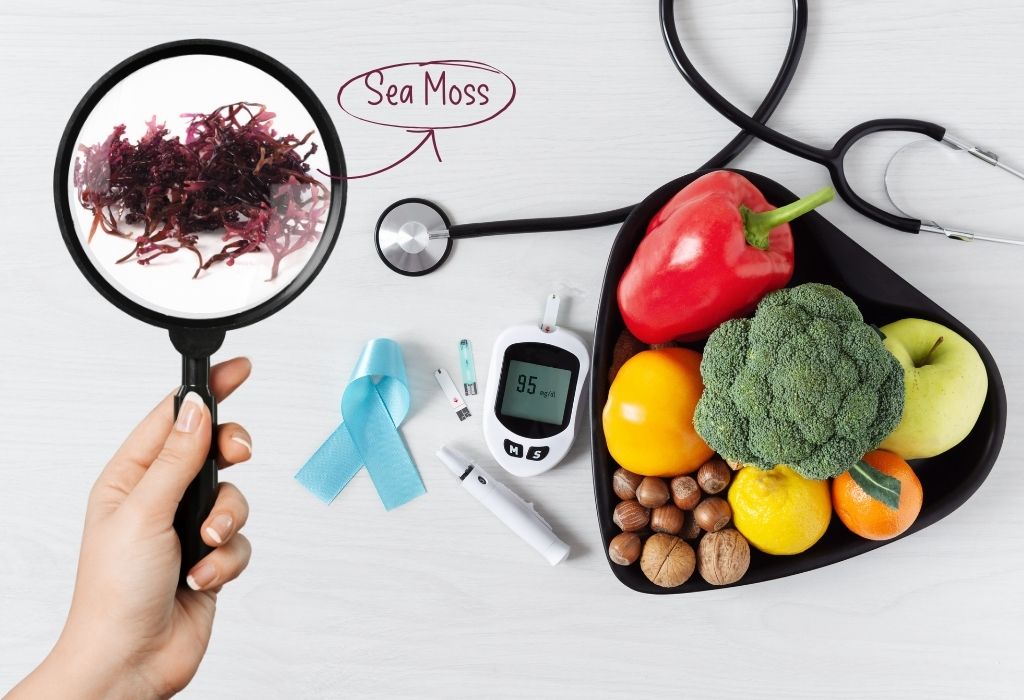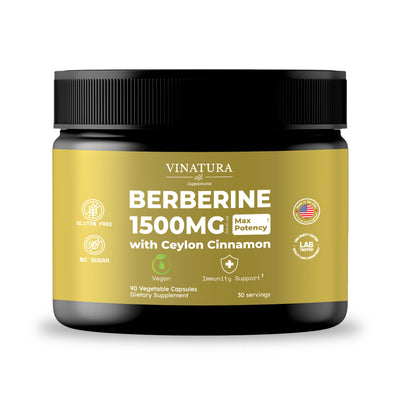
Is Sea Moss Good For Diabetics?
Sea moss is believed to benefit diabetic patients by helping to control blood sugar levels, manage weight, reduce harmful cholesterol levels, and support thyroid function. If you are among those interested in natural remedies to support diabetes-related issues, refer to the article below to find answers.
Before exploring further, please read the disclaimer located at the end of this webpage.
Key Takeaways
- Sea moss benefits individuals with diabetes as it helps control blood sugar levels, reduces insulin resistance, lowers bad cholesterol, and supports thyroid function.
- Sea moss cannot cure diabetes as it is a dietary supplement, not a medication.
- The recommended dosage of sea moss is up to 4 - 8 grams per day (for dried form) and 1 - 2 tablespoons per day (for gel form).
Is sea moss good for diabetics?

Sea moss is beneficial for individuals with diabetes when used at appropriate dosages due to its compound content, which may positively interact with insulin for health benefits.
There is insufficient evidence to suggest that sea moss can cure diabetes. However, some studies indicate that sea moss contains fucoxanthin, a Carotenoid that helps reduce insulin resistance, thereby aiding in body weight reduction in obese individuals. This compound also significantly controls blood sugar, preventing sudden spikes [1].
What are the Benefits of Sea Moss for Diabetics?
After understanding the beneficial impact mechanism of sea moss on diabetes, let's delve deeper into the specific benefits that sea moss may provide for health:
Helps Lower Blood Sugar and Reduce Insulin Resistance
As mentioned earlier, sea moss contains fucoxanthin, a quality Carotenoid that helps reduce blood sugar levels [1]. This compound works through insulin reaction mechanisms, enabling our bodies to naturally regulate blood sugar without leaving serious side effects.
Additionally, sea moss contains carrageenan, a soluble fiber, which slows down glucose absorption in the blood, thus positively affecting blood sugar control and improving abnormal glucose levels in individuals with diabetes.
Sea moss also supplements essential nutrients often lacking in individuals with diabetes, such as zinc, iron, magnesium, and iodine. Research indicates that effective zinc supplementation can help control blood sugar levels, aiding in the prevention and management of diabetes [3].
High magnesium levels enhance the body's ability to control blood sugar. Meanwhile, iodine also contributes to maintaining a healthy body, promoting metabolic processes, and supporting thyroid function.
Improves Thyroid Function and Prevents Diabetic Kidney Disease

Sea moss contains high levels of iodine, which is essential for individuals with thyroid issues related to diabetes.
Studies have found that diabetes and thyroid disorders often coexist in a patient. Both are related to endocrine dysfunction. Thyroid disorders can significantly affect glucose control and, if not promptly supported, can impact diabetes management [4].
Experts have also studied iodine deficiency as a potential cause of thyroid disorders in adults; severe iodine deficiency can cause goiter and thyroid dysfunction due to insufficient concentrations to produce thyroid hormones [5]. Therefore, if you are looking for a natural food supplement rich in natural iodine per serving, sea moss can help protect your health, control blood sugar, and limit the possible occurrence of thyroid disorders.
Support Weight Loss and Prevent Obesity
Weight and excess body fat play a significant role in managing the health of patients with type 2 diabetes (T2DM). Weight loss is believed to help improve blood sugar control, restrict calorie intake, and reverse the progression of T2DM development [6].
A 15g portion of sea moss contains 10 calories, 0g fat, 2g carbohydrates, and 1g fiber. It is low-calorie, very low carbohydrate, virtually fat-free, and has stable fiber content, which helps you feel fuller longer when consuming sea moss.
The nutrients in sea moss also act as a prebiotic, balancing the gut microbiota, supporting fat-burning processes, and helping to break down and metabolize fat more effectively, accelerating the weight loss process.
May Reduces Bad Cholesterol and Prevents Cardiovascular Disease
Individuals with diabetes are at twice the risk of developing cardiovascular disease compared to normal individuals due to adverse effects on body cholesterol levels.
Recent studies have shown that sea moss benefits the heart because it contains substances that can reduce bad cholesterol and act as an anticoagulant and good antioxidant [7].
How to use Sea Moss for Diabetics

Before learning to use sea moss for individuals with diabetes, you should understand the dosage to consume safely and ensure health safety.
Dosage: Sea moss is recommended to be used up to 4 - 8 grams daily, equivalent to no more than 1 - 2 teaspoons per day [8]. However, caution and consultation with a doctor before use are needed for patients with thyroid problems and high iodine levels in the body.
How to use:
- Use dried sea moss: 4 - 8 grams/day. It can be combined with salads, main dishes, or desserts.
- Use sea moss gel: 1 - 2 tablespoons. Combine it with favorite beverages suitable for smoothies and fruits to make a cool smoothie.
- Use sea moss in capsule form or tablets: Dosage depends on each manufacturer. This is the fastest and easiest way to use, suitable for busy people who still want to manage their health well.
Timing: You can use dried sea moss whenever it's convenient, during meals, or as a snack. It is best to follow the manufacturer's instructions for sea moss extracted in the form of functional foods.
Note: Before using any food or dietary supplement, consult your doctor about dosage and usage to ensure safety.
Risk and Side Effects of Sea Moss Diabetics Need to Know
Although no study has reported serious side effects of sea moss use, similar to other dietary supplements, sea moss still carries many risks if consumed in high doses. Specifically, they may cause:
- Indigestion, bloating
- Loss of appetite
- Light diarrhea
- Nausea, vomiting
- Abdominal pain, constipation
- High blood pressure, low blood pressure
- Fatigue
- Poisoning
Sea moss contains natural iodine, but consuming too much can cause iodine poisoning, putting significant pressure on the thyroid gland and undermining the above mentioned benefits. Therefore, you need to control the dosage well and know the most suitable usage for your health.
Frequently Asked Questions
Can Sea Moss Cure Diabetes?
No, sea moss cannot cure diabetes. Treating type 1 or type 2 diabetes depends on many other factors of the body and requires strict monitoring by healthcare professionals. Sea moss is just a dietary supplement, not a medication.
How Does Sea Moss Influence Insulin Levels?
Sea moss contains compounds like fucoxanthin and carotenoids, effectively controlling blood sugar levels and reducing insulin resistance.
Can Sea Moss Assist with Diabetic Neuropathy?
Sea moss can effectively control complications caused by diabetic neuropathy. By supplementing natural iodine, sea moss can help patients enhance cognition and reduce complications caused by the disease.
Is It Safe to Use Sea Moss Alongside Metformin?
There are no reported contraindications to the combination of sea moss and Metformin. However, you should consult a specialist before using them to ensure safety.
Conclusion
In conclusion, sea moss contains many nutrients, fibers, and beneficial compounds for patients with diabetes. This article has provided studies on blood sugar control, diabetes improvement, and related complications. Also, remember to follow the dosage and consult a specialist before supplementing any functional foods into your body.
References
- [1] Maeda. "Anti-Obesity and Anti-Diabetic Effects of Fucoxanthin on Diet-Induced Obesity Conditions in a Murine Model." Molecular Medicine Reports, vol. 02, no. 06, 15 Sept. 2009, https://doi.org/10.3892/mmr_00000189.
- [2] Wishwakulathil, D. T., et al. "Sea Moss as an Alternative Gelling Agent to Develop a Cost-Effective in Vitro Culture Medium for the Propagation of Phalaenopsis Cv. Pink Lip." Repository.kln.ac.lk, 2023, repository.kln.ac.lk/handle/123456789/27014. Accessed 22 July 2024.
- [3] Wang, Xinhui, et al. "Zinc Supplementation Improves Glycemic Control for Diabetes Prevention and Management: A Systematic Review and Meta-Analysis of Randomized Controlled Trials." The American Journal of Clinical Nutrition, vol. 110, no. 1, 4 June 2019, pp. 76–90, academic.oup.com/ajcn/article/110/1/76/5510583, https://doi.org/10.1093/ajcn/nqz041.
- [4] Hage, Mirella, et al. "Thyroid Disorders and Diabetes Mellitus." Journal of Thyroid Research, vol. 2011, 12 July 2011, pp. 1–7, www.ncbi.nlm.nih.gov/pmc/articles/PMC3139205/, https://doi.org/10.4061/2011/439463.
- [5] B Zimmermann, Michael. Iodine Deficiency and Thyroid Disorders. 12 Jan. 2015, www.thelancet.com/journals/landia/article/PIIS2213-8587(14)70225-6/abstract?code=lancet-site&rss=yes=. Accessed 22 July 2024.
- [6] Wilding, J. P. H. "The Importance of Weight Management in Type 2 Diabetes Mellitus." International Journal of Clinical Practice, vol. 68, no. 6, 18 Feb. 2014, pp. 682–691, www.ncbi.nlm.nih.gov/pmc/articles/PMC4238418/, https://doi.org/10.1111/ijcp.12384.
- [7] Magalhaes, Kaline Dantas, et al. “Anticoagulant, Antioxidant and Antitumor Activities of Heterofucans from the Seaweed Dictyopteris Delicatula.” International Journal of Molecular Sciences, vol. 12, no. 5, 23 May 2011, pp. 3352–3365, www.ncbi.nlm.nih.gov/pmc/articles/PMC3116195/, https://doi.org/10.3390/ijms12053352.
- [8] Quiñones, Stephanie. Sea Moss for Hair: Discover How You Can Solve Hair Loss, Hair Damage, Hair Breakage, Frizz, Split-Ends, Scalp Irritation, and Much More Using Dr. Sebi's Guide on How to Use Sea Moss on Hair. Google Books, Stephanie Quiñones, 15 Nov. 2021, books.google.com.vn/books?hl=vi&lr=&id=pZdOEAAAQBAJ&oi=fnd&pg=PT6&dq=sea+moss+dosage&ots=b0fTmtaCsy&sig=NMXtl5IeHtoYtO48-hT6yXtaimU&redir_esc=y#v=onepage&q=sea%20moss%20dosage&f=false. Accessed 22 July 2024.
Author

Product Disclaimer
The dietary supplement products mentioned on this website are formulated based on scientific research and adhere to FDA guidelines for dietary supplements. However, the content of the articles has not been evaluated by the Food and Drug Administration (FDA) and is not intended to promote or endorse any specific product. Any products sold on this website are not intended to diagnose, treat, cure, or prevent any disease.
Opinions and Endorsements
Any claims, statements, or opinions expressed in the articles are those of the author(s) and do not necessarily reflect the views or opinions of the manufacturers of the dietary supplement products. The products sold on this website are separate from the content of the articles and are not directly endorsed or associated with the information presented here.
Liability Disclaimer
The author(s) of the articles, website, and manufacturers of the dietary supplement products do not assume any liability for any potential consequences arising from the use of the information provided in the articles. It is recommended that individuals consult with a qualified healthcare professional before making any dietary or lifestyle changes, including the use of dietary supplements.
Product Usage
Please refer to the product labels and packaging for specific usage instructions and guidelines for the dietary supplement products sold on this website.
Customer Support
For any concerns or questions regarding the dietary supplement products, please contact our customer support team, who will be more than happy to assist you.





Leave a Comment
Be the first to comment.
What do you think?